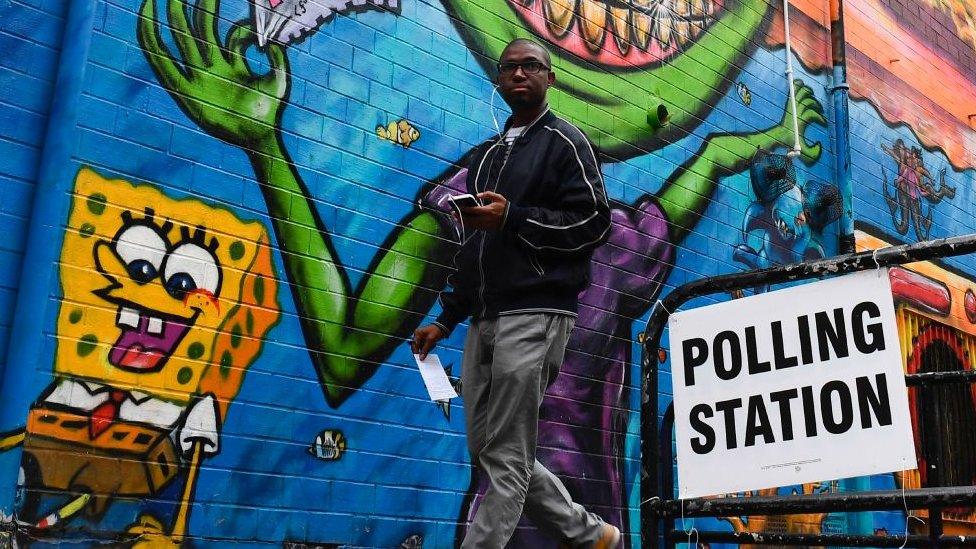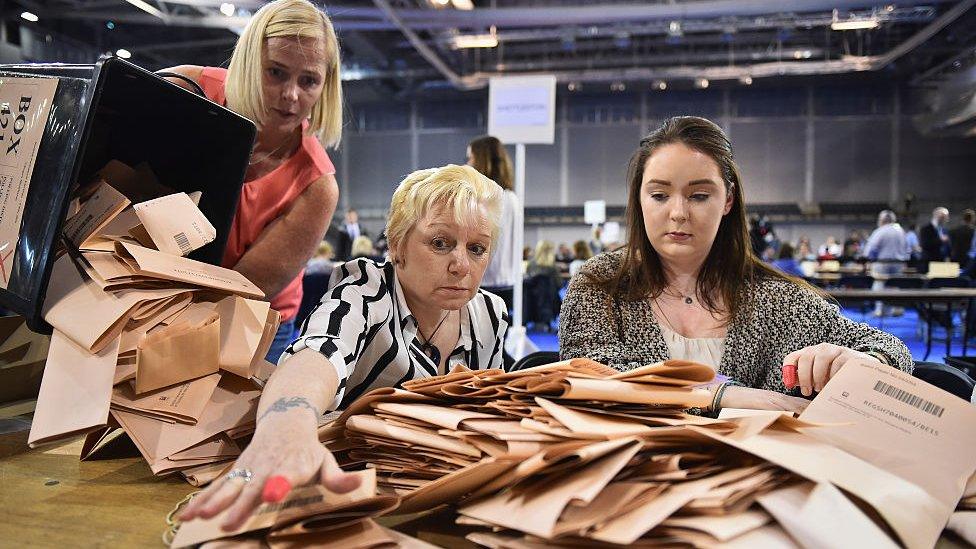Elections 2022: How do I vote?
- Published

Elections for 200 councils in England, Scotland and Wales - as well as Northern Ireland's government - take place on 5 May.
How can you make sure you are registered to vote?
Can I vote?
The rules for who can vote vary slightly depending on where you live.
You will need to be registered to vote and:
Aged 18 or older in England or Northern Ireland
Aged 16 or older in Scotland or Wales
As well as British citizens, people from EU or Commonwealth countries who are resident in the UK can vote in England and Northern Ireland.
In Scotland and Wales, any foreign citizen living legally in the country can vote.
Most prisoners - except those on remand - aren't allowed to vote. There are limited exceptions for people released on licence and, in Scotland, some some prisoners on short sentences., external
How do I register to vote?
The deadline to register to vote has passed. If you're not sure whether you're registered, you can get in touch with your local council's election team, external.
What am I voting for?
It depends where you live. In England, 146 councils are holding elections, including Leeds, Manchester, Birmingham and all 32 London boroughs. South Yorkshire will also be voting for a regional mayor and 1,000 parish councils will be holding elections.
All of Scotland's 32 councils, and all 22 councils in Wales, are holding elections. In Northern Ireland, voters will be choosing 90 members of the Northern Ireland Assembly, where laws are scrutinised and passed.
How do I vote in person?
Polling stations will be open from 07:00 to 22:00 on 5 May and if you're still in a queue to vote when polls close at 22:00 you are guaranteed entry.
Beforehand, you should receive a polling card in the post telling you where your local polling station is. You don't have to take it with you. However, in Northern Ireland you will need to bring photo ID, external.

Polling stations are usually in public buildings such as schools, leisure centres or churches. If you're not sure where yours is, contact your local authority's election office, external.
When you enter you will be given a ballot paper. This will have a list of the candidates standing in the election you are able to vote in.
Make sure you read the instructions on the ballot paper - in some elections you can choose more than one candidate or rank them in order of preference.
You then take it to a booth and mark your vote in private. You will be asked to fold the ballot paper and put it in the ballot box.
You are not allowed to discuss your vote in the polling station.
You're also advised not to take selfies because you could accidentally give away how someone else voted (the person in the booth next to you, for example), which is illegal.
Can I vote by post?
You can vote by post, but you need to apply in advance. This means printing and posting an application form to your local council or the Electoral Office for Northern Ireland, external. Some councils will allow you to send online applications but you should check with your local authority.
The deadline to apply to vote by post in England, Scotland and Wales, external is 17:00 on 19 April, and in Northern Ireland it is 17:00 on 12 April.
You will receive your ballot in the post, with instructions on how to cast your vote and return it correctly.

What is a proxy vote?
Nominating someone to vote on your behalf is known as a proxy vote. However, you need to have a reason why you cannot vote in person, for example a disability.
The deadline for applying for a proxy is 17:00 on 26 April in England, Scotland and Wales, and 17:00 on 12 April in Northern Ireland.
What if I have Covid on election day?
In England, Scotland and Wales, in some circumstances - including having Covid - you can apply for an emergency proxy vote until 17:00 on polling day. If you have already signed up to vote by proxy and the person you've nominated has Covid, you have until the same deadline to nominate somebody else.
Emergency proxy votes are not available in Northern Ireland.
When will I know the results?
The timing of the results depends on when the count begins. In England, just over half of the councils are expected to count overnight on Thursday after polls close, with the rest beginning on Friday morning.
Counts in Scotland, Wales and Northern Ireland are all expected to begin on Friday 6 May - so most results should be known by Friday evening.
